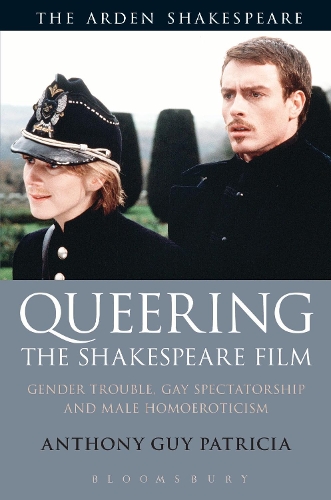
Queering the Shakespeare Film: Gender Trouble, Gay Spectatorship and Male Homoeroticism
(Paperback)
Publishing Details
Queering the Shakespeare Film: Gender Trouble, Gay Spectatorship and Male Homoeroticism
By (Author) dr Anthony Guy Patricia
Bloomsbury Publishing PLC
The Arden Shakespeare
7th February 2019
United Kingdom
Classifications
Tertiary Education
Non Fiction
Literary studies: c 1600 to c 1800
Film history, theory or criticism
LGBTQIA+ Studies / topics
791.436
Physical Properties
Paperback
320
Width 128mm, Height 196mm, Spine 18mm
360g
Description
This open access study offers queer readings of 10 key film productions of Shakespeare plays from the past 80 years.
A range of mainstream and independent English language film productions of A Midsummer Nights Dream, Romeo and Juliet, Othello, Twelfth Night, and The Merchant of Venice take centre stage in Queering the Shakespeare Film. This study critiques the various representations of the queer broadly understood as that which is at odds with what has been deemed to be the normal, the legitimate, and the dominant, particularly, but not exclusively, as regards sexual matters - in the Shakespeare film. The movies chosen for analysis correspond deliberately with those Shakespeare plays that, as written texts, have been subjected to a great deal of productive study in a queer context since the beginnings of queer theory in the early 1990s. Thus the book extends the ongoing queer discussion of these written texts to their counterpart cinematic texts. Queering the Shakespeare Film is a much-needed alternative and complementary critical history of the Shakespeare film genre.
The ebook editions of this book are available open access under a CC BY-ND licence on bloomsburycollections.com. Open access was funded by Knowledge Unlatched.
Reviews
Queering the Shakespeare Film offers an indispensable, enlightening, account of the play of dissident genders and sexualities in cinematic versions of Shakespeares major comedies and tragedies. -- Mario DiGangi, The Graduate Center, City University of New York, USA
Lucidly written and meticulously researched, Queering the Shakespeare Film offers the vital insight that cinematic adaptations of Shakespeare have always been queer, even if explicitly homoerotic plots and genderqueer characters are a recent phenomenon. Patricias book will be required reading for students, scholars, and even general audiences of Shakespearean film. -- Melissa E. Sanchez, University of Pennsylvania, USA
Author Bio
Anthony Guy Patricia is Assistant Professor of English in the Department of Humanities at Concord University in Athens, West Virginia, USA.
